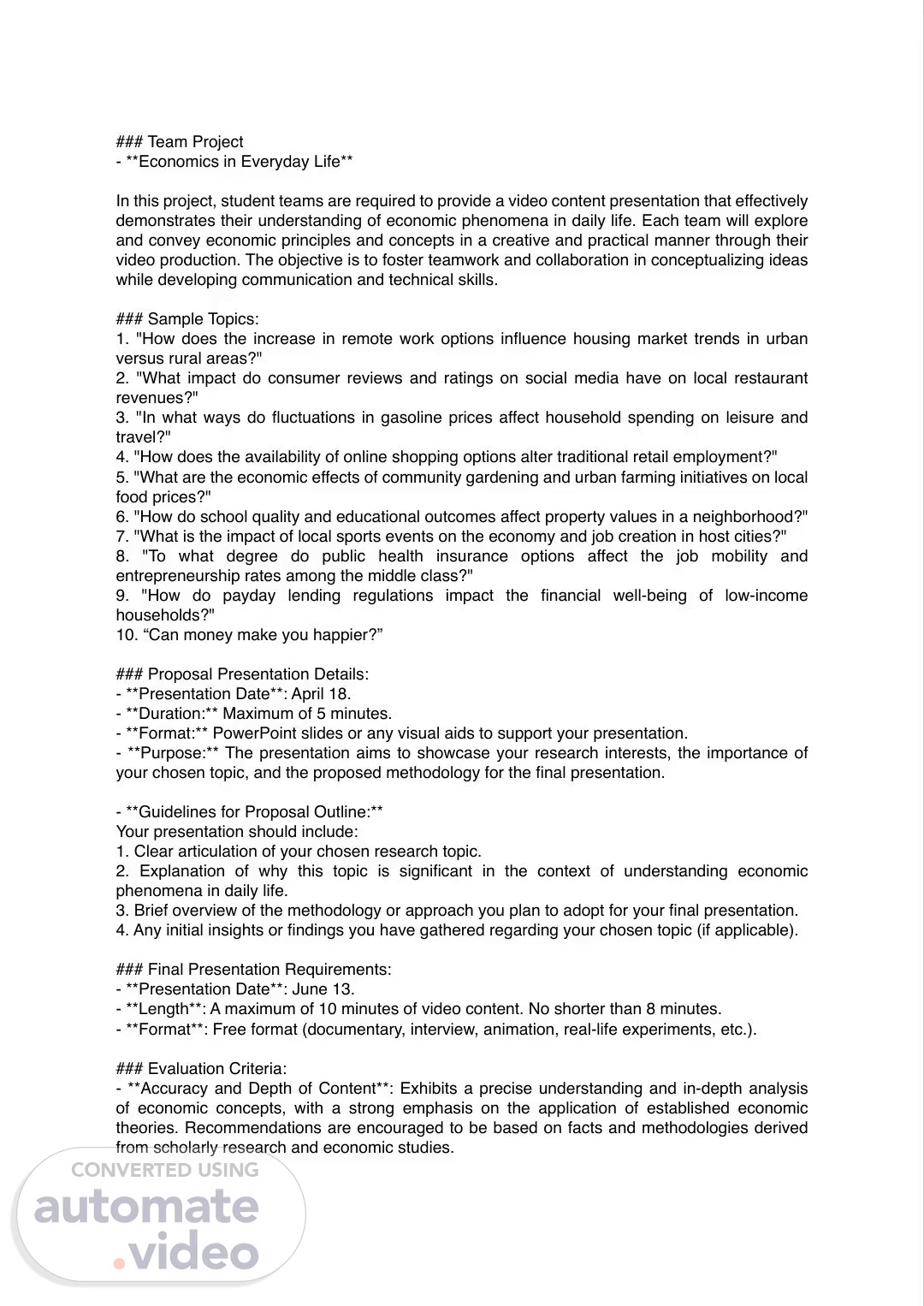Scene 1 (0s)
### Team Project - **Economics in Everyday Life** In this project, student teams are required to provide a video content presentation that effectively demonstrates their understanding of economic phenomena in daily life. Each team will explore and convey economic principles and concepts in a creative and practical manner through their video production. The objective is to foster teamwork and collaboration in conceptualizing ideas while developing communication and technical skills. ### Sample Topics: 1. "How does the increase in remote work options influence housing market trends in urban versus rural areas?" 2. "What impact do consumer reviews and ratings on social media have on local restaurant revenues?" 3. "In what ways do fluctuations in gasoline prices affect household spending on leisure and travel?" 4. "How does the availability of online shopping options alter traditional retail employment?" 5. "What are the economic effects of community gardening and urban farming initiatives on local food prices?" 6. "How do school quality and educational outcomes affect property values in a neighborhood?" 7. "What is the impact of local sports events on the economy and job creation in host cities?" 8. "To what degree do public health insurance options affect the job mobility and entrepreneurship rates among the middle class?" 9. "How do payday lending regulations impact the financial well-being of low-income households?" 10. “Can money make you happier?” ### Proposal Presentation Details: - **Presentation Date**: April 18. - **Duration:** Maximum of 5 minutes. - **Format:** PowerPoint slides or any visual aids to support your presentation. - **Purpose:** The presentation aims to showcase your research interests, the importance of your chosen topic, and the proposed methodology for the final presentation. - **Guidelines for Proposal Outline:** Your presentation should include: 1. Clear articulation of your chosen research topic. 2. Explanation of why this topic is significant in the context of understanding economic phenomena in daily life. 3. Brief overview of the methodology or approach you plan to adopt for your final presentation. 4. Any initial insights or findings you have gathered regarding your chosen topic (if applicable). ### Final Presentation Requirements: - **Presentation Date**: June 13. - **Length**: A maximum of 10 minutes of video content. No shorter than 8 minutes. - **Format**: Free format (documentary, interview, animation, real-life experiments, etc.). ### Evaluation Criteria: - **Accuracy and Depth of Content**: Exhibits a precise understanding and in-depth analysis of economic concepts, with a strong emphasis on the application of established economic theories. Recommendations are encouraged to be based on facts and methodologies derived from scholarly research and economic studies..
Scene 2 (3m 8s)
- **Creativity and Originality**: Displays a creative approach to the topic with originality in video production, incorporating economic principles in innovative and thought-provoking ways. - **Viewer Engagement and Clarity**: Ensures clarity of content, presenting economic information in engaging and accessible ways to captivate the audience and facilitate understanding. - **Viewer Value and Enjoyment**: Produces content that is both enlightening and enjoyable, aiming to enrich the audience's understanding of economic issues while providing an entertaining viewing experience. The technical execution, including video editing and audiovisual quality, should complement the educational content, making it relatable and engaging for the viewer. ### Submission Method: On each presentation date, your team is required to upload a video of your presentation to the "Final Projects" board on E-Class. Physical attendance in the classroom is not required. Instead, all students should watch the presentations of other teams at their convenience. Students are also expected to provide feedback on other teams' presentations, which is a great way to earn participation bonuses. ### Team Formation: Due to the large class size, it is mandatory for each team to be comprised of exactly 5 members. This requirement ensures that all students have the opportunity to participate actively and contribute equally to the project. As soon as you have formed your teams, please write the following information on the “Final Projects” board in E-Class: student names, majors, and student IDs. Students who have not joined a team by March 16 will be randomly grouped by the professor. ### Disclaimer: Free-riders in team projects will receive a zero score for their portion of the team project, which constitutes 30% of the total grade..
